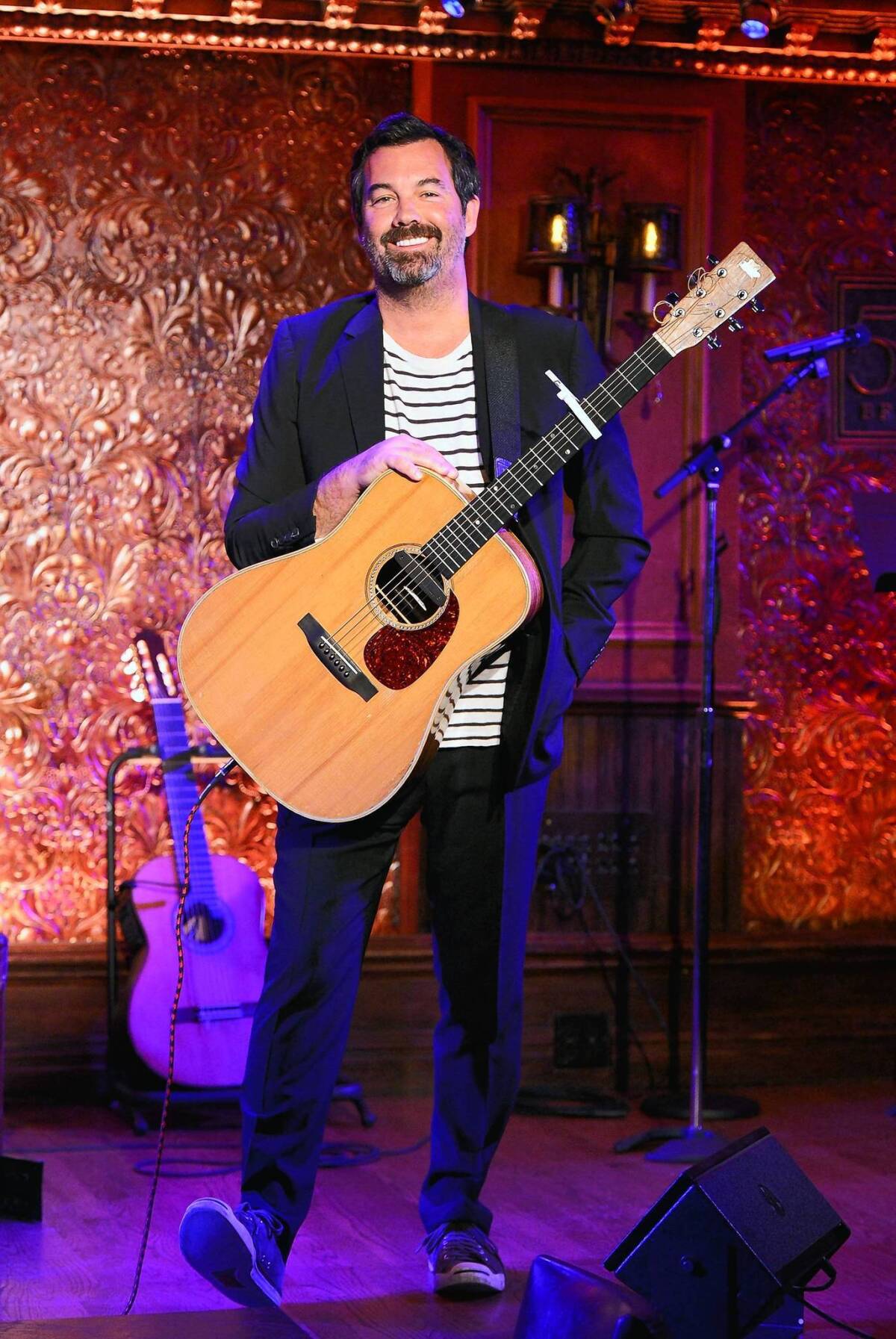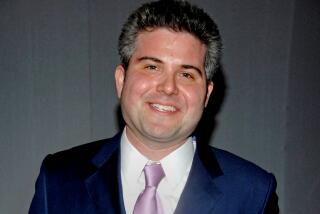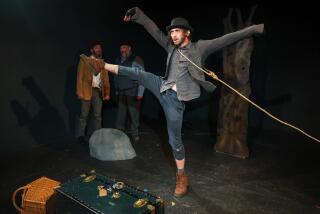‘American Psycho’ composer Duncan Sheik aims for a killer beat

LONDON — “Abandon all hope ye who enter here.”
The quote from Dante, scrawled as graffiti on a New York wall, opens Bret Easton Ellis’ incendiary 1991 novel, “American Psycho.” The famous phrase is ostensibly about entering the gates of hell, but it could apply equally to the long, exhausting process of creating a major new musical.
Ellis’ use of Dante is not lost on the ambitious team behind “American Psycho,” the new stage musical based on the novel — the phrase also appears on large video projections over London’s Almeida Theatre stage.
PHOTOS: Arts and culture in pictures by The Times
The task of adapting such a challenging story weighed on composer Duncan Sheik. “All that part of it is terrifying,” he says. “The reality is, I’ve invested a few years of my life, I’ve written 14 songs that I’ve put a lot of heart into, so you kind of can’t stop.”
Sheik is sitting in the café of the Almeida Theatre, the day after “American Psycho’s” first preview at the small, off-West End playhouse in London’s Islington district. The play opens Thursday.
“I’m feeling much better today, because all things being equal, it was probably the best first preview of anything I’ve ever done.” Among Sheik’s work is “Spring Awakening,” which won the 2007 Tony award for best musical.
He knows that success ratchets up the pressure, but “at a certain point you have be, ‘let’s see what happens, guys,’” Sheik says. “It’s a case in point of just how difficult it is to make a musical. It’s just an incredibly hard thing to pull off.”
And perhaps harder with the story of Patrick Bateman, a well-toned, well-tanned investment banker who works in the fictional firm of Pierce and Pierce’s mergers and acquisitions (“murders and executions,” he calls it) by day and may or may not be a serial killer by night.
CRITICS’ PICKS: What to watch, where to go, what to eat
The news media here has been following “American Psycho” avidly, one factor being that Matt Smith, recently of TV’s venerated “Doctor Who,” plays Bateman. But Ellis’ dark portrait of manicured metrosexuals in 1980s Wall Street — published just as the recession of the early ‘90s was prompting reevaluations of the Reagan era — has always made headlines.
The book was initially dropped by Random House and was released as a straight-to-paperback title by Vintage. Despite some vicious reviews and generally negative press, “American Psycho” struck a nerve and sold over 1 million copies in the U.S. It is in its 58th printing.
A 2000 film directed by Mary Harron (starring a pre-”Dark Knight” Christian Bale as Bateman) solidified the character’s mythic status, but Bateman doesn’t exactly scream out to be the lead in a conventional book musical.
And musicals with lots of blood are an even tougher sell. Yes, “Sweeney Todd” proved that a murderous antihero can work on Broadway, but many others have failed and crashed in big ways: posters for “Carrie,” Elton John’s “Lestat” and “Dracula” all grace Joe Allen’s infamous “flop wall.”
“The show is bold — so it may well be polarizing,” admits Sheik, “and part of me feels like if it’s not polarizing, then we’ve done something wrong.”
PHOTOS: Conductors’ pop music favorites
He says that conventional Broadway shows aren’t always his cup of tea. “We’ve tried not to go into traditional musical numbers too often. On ‘Spring Awakening,’ one of my big goals was to imagine a piece of musical theater where the score was close to the contemporary music of the day — and in that case, it was indie rock. If you look at what’s going on in contemporary music right now, certainly in Europe but even in America, electronic dance music is enormous.”
Sheik says bridging the gap between the electronic and pop music of the 1980s (which features prominently in Ellis’ book; entire chapters are devoted to Genesis, Whitney Houston and Huey Lewis & the News) and current electronic musical sounds and idioms helped create the musical voice of “American Pyscho.”
“I grew up with all of that music,” he says with a laugh. “I went to see Genesis in 1984 at Madison Square Garden, so maybe I was at that show where Luis and Patrick Bateman were.”
The composer himself performed one number from the show, “This Is Not an Exit,” at 54 Below in New York, and it was clear that Sheik had gotten inside of Bateman’s head. “The problem is Patrick Bateman’s taste in music is awful,” he says. “He’s so dark and crazy, but his taste in music is so vanilla. The trick is: It can’t be not kitsch. We’re not trying to make fun of that era of music, but we want to have fun with it.”
In the Almeida production (directed by Rupert Goold, recently seen on Broadway with “Enron,” and the sexy, Soviet-chic “Macbeth” with Patrick Stewart) Sheik’s new songs are blended with actual songs from True Faith, Tears for Fears and of course, Genesis: An a capella version of “In the Air Tonight” is an ominous transition from Patrick’s public facade to his inner demons.
PHOTOS: Disney Hall conductors
“My original conception was, whenever we go to that music, we’ll call them cover songs, that we find some way of re-imagining how they sound and how they’re used on stage ... and not just [sound] like someone’s pressing play on a tape recorder,” Sheik says. “It gives a contrast with the music that I wrote, which is pretty full-on electronic music.
Just as Sheik feels that synthesizer music’s flashy sonic surfaces can hide a deeper richness, he says the pop aspects of “American Psycho” are necessary to convey the story’s socio-political undercurrents. “The book was so prescient,” Sheik says, “this crazy ‘greed-is-good’ ethos, that we thought was an aberration at the time, it’s definitely continued. I mean, when I read the book in college it was somewhat off-putting … but as annoying as those long passages listing menu items were, look at how obsessed our culture is with food now.”
Sheik hopes the show extends in London, and although he insists that the only looking ahead he’s doing after this run is to a new album he has coming out next year, he hopes the show eventually makes it to New York.
Is Broadway ready for Patrick Bateman? “Well, it is ‘American Psycho,’ after all…” he says.
More to Read
The biggest entertainment stories
Get our big stories about Hollywood, film, television, music, arts, culture and more right in your inbox as soon as they publish.
You may occasionally receive promotional content from the Los Angeles Times.










